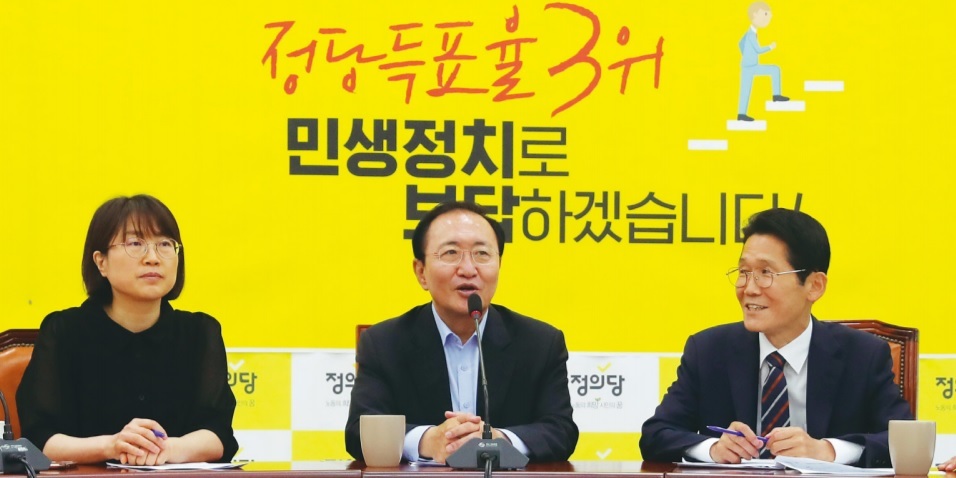Posted on : Jul.10,2018 16:53 KST
Modified on : Jul.10,2018 17:03 KST
 |
|
Roh Hoe-chan (center), current floor leader of the Justice Party, speaks at a general party meeting at the National Assembly in Seoul on July 3. The Justice Party received around 9 percent of the vote during the June 13 local elections. (Shin So-young, staff photographer)
|
According to a public opinion poll released on July 9, South Korea’s Justice Party had an approval rating of 10.4 percent, the highest level since its establishment. In this poll of 2,504 people around the country, which was carried out on July 2-6 by polling organization Real Meter on behalf of CBS, the party’s support increased for the sixth week in a row. The increasing support for the Justice Party with its avowedly progressive platform should be noted as one of the clearest changes since the June 13 local elections.
The Justice Party’s double-digit approval rating is consistent with the conservative opposition’s crushing defeat in those elections, as well as the dissolution of regionalism, which those elections made clear. There is a growing tendency for voters to break free from inertia and select parties and candidates according to a new political calculus. In an opinion poll released by Gallup Korea on July 6, the Justice Party outpolled the Liberty Korea Party in the greater capital region, including Seoul, Incheon and Gyeonggi Province.
South Korea’s progressive parties (of which the Justice Party is the most prominent) have long taken the leading in advancing a progressive agenda – which includes reforming the chaebols, expanding welfare, protecting irregular workers and suspending the construction of nuclear reactors – and now it appears that Koreans are starting to notice with approval. One apparent factor in the growing support for the party is the populist positions it has taken on recent issues.
The party has not only called for the end of “gapjil” (the tendency for authority figures to exploit their subordinates), but it has also returned the “special activity fee” given to parties represented in the National Assemblies and pushed to shut down the payments.
Given the entrenchment of the two-party system in South Korean politics, there is little room left for progressive parties. During the June 13 local elections, the Justice Party only took a single seat on the Seoul city council (0.9 percent of the total) despite receiving 9.69 percent of the vote, while the Democratic Party swept 102 of 110 total seats (92.72 percent) with just 50.92 percent of the vote. This makes plain the shortcomings of a system in which the votes received do not match the seats won. In other words, the system is unable to keep up with the people’s shifting perspective on politics. There is an urgent need to correct this by reorganizing the constituency system.
In South Korea, the status of progressive parties is a barometer showing how much our politics have evolved. Given the current failure of progressive parties in the Western sense of the term to become established in the country, it is extremely significant that a proper progressive party is putting down its roots.
With the conservative parties in an existential crisis following the local elections, we can make a cautious prediction about the possibility of a reshuffle that produces functional conservative and progressive parties. This trend could create a major opportunity for the Justice Party. Our hope is that this party will steadily move closer to the people by adopting progressive policies that are tailored to their lives.
Please direct comments or questions to [english@hani.co.kr]









